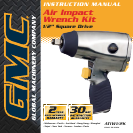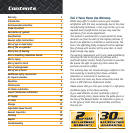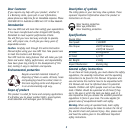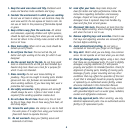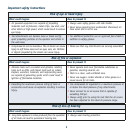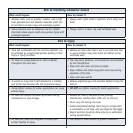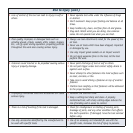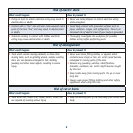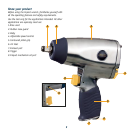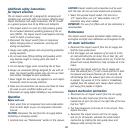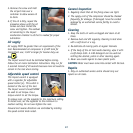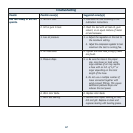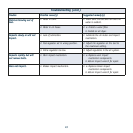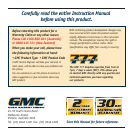
7
Risk to injury (cont.)
• Loss of control of the tool can lead to injury to self or
others.
• Never operate tool while under the influence of drugs
or alcohol.
• Don’t overreach. Keep proper footing and balance at all
times.
• Keep handles dry, clean, and free from oil and grease.
• Stay alert. Watch what you are doing. Use common
sense. Do not operate tool when you are tired.
• Poor quality, improper, or damaged tools such as
grinding wheels, chisels, sockets, drills, nailers, staplers,
etc., can fly apart during operation, propelling particles
throughout the work area causing serious injury.
• Always use tool attachments rated for the speed of the
air tool.
• Never use air tools which have been dropped, impacted
or damaged by use.
• Use only impact grade sockets on an impact wrench.
• Do not apply excessive force to the tool, let the tool
perform the work.
• Fasteners could ricochet or be propelled causing serious
injury or property damage.
• Never point discharge of tool at self or others.
• Do not pull trigger unless tool contact safety device is
against work surface.
• Never attempt to drive fasteners into hard surfaces such
as steel, concrete, or tile.
• Take care to avoid driving a fastener on top of another
fastener.
• Position tool carefully so that fasteners will be delivered
to the proper location.
• Improperly maintained tools and accessories can cause
serious injury.
• Maintain the tool with care.
• Keep a cutting tool sharp and clean. A properly
maintained tool, with sharp cutting edges reduces the
risk of binding and is easier to control.
• There is a risk of bursting if the tool is damaged. • Check for misalignment or binding of moving parts,
breakage of parts, and any other condition that affects
the tool’s operation. If damaged, have the tool serviced
before using.
• Use only accessories identified by the manufacturer to
be used with specific tools.
• Use of an accessory not intended for use with the
specific tools, increases the risk of injury to persons.



